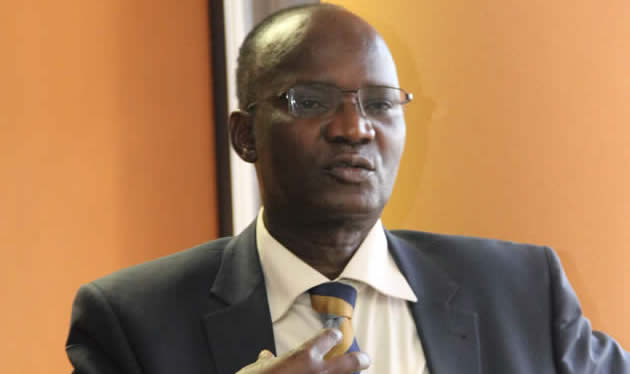Ukraine: When the people ‘coup’ democracy
The Other Side Nathaniel Manheru
Throughout human history, the masses have always been an ambiguous political magnitude. Each generation has had to decide what to call them, with each description implying concession or censure, as far as their role in society is concerned. In feudal history, the masses were a nameless magnitude, the face of menacing chaos never to be indulged, if the social structure was to be safeguarded. Feudalism was an era of kings, lords, ladies and knights, a martial era where the poor had no place, had no name beyond serfdom. The power was the king, its foremost symbols the sceptre and throne; its home the castle, it’s means taxation, war and marriage.
When order was godly
Expectedly the masses in Shakespearian days were always depicted as a mindless mob, a real menace driven by “vulgar wits”, and always fickle in times of war or social upheaval. They could not be relied upon, or made to lead in social action. Wars were always a way of expending surplus populations, theatres and other public spectacles a cathartic way of keeping them sedate and thus less threatening to social order. The whole Elizabethan notion of “the great chain of being” was a rigid law-and-order philosophy, a belief of extraordinary potency when it came to sanctioning social action. And its potency rested in its metaphysical, scriptural aura which made it inviolate.
Order was godly.
The great hierarchy
At the top was God the Almighty, followed by Arch-angels. Then came angels, beneath which fell Man embodied in the King, himself viewed as “God’s deputy”, and thus a human expression of divine will and order. Then came animal kingdom, with the Lion representing “the king of the jungle”. That transposition of the regal nomenclature into dumb animal kingdom was meant to reinforce order as a value ordained by divinity. Even mute beast innately followed and obeyed this divine structuring! In the plant world, the same power hierarchy subsisted, with the Oak being the king. I left out creatures of the “Deep” where the Shark was the king.
And its great chain of being
And connecting all these levels, these spheres with all their power personifications, was an imaginary great chain created by God to ensure that everything was interconnected and kept in proper place or station, all for greater, overall order. Any disturbances at any one level would rattle and even snap this great chain, in the process triggering and unleashing chaos in the whole cosmos. God was not supposed to be deposed, which is why His mighty Hand smote the rebellious archangel Satan, flinging him into the bottomless pit. That retributive, godly action triggered a trans-millennia fall which Christians believe is still underway, even as I write! Satan is still on his way down, from those remote days of the celestial rebellion. And of course when Milton’s God acts against Satan, the whole cosmos shakes to register both the disorder threatened by Satan’s actions, and the cataclysm which corrective, godly action entails. Similarly, when Shakespeare’s King Duncan is assassinated by the ambitious Macbeth, not only are animals in frightful riot, so too are the elements, with the belching waters of the deep invading and menacing the land as if to leave their ordained place in the trough of oceans, in a bid to displace and usurp the place of the land. Shakespeare’s Roman plays, principally Coriolanus, bring out this sense of order or its antithesis.
Liberty, fraternity and equality
While historians celebrate the French Revolution of 1789, there was, as it unfolded, a clear consternation in mainland Europe and England, both havens of monarchical rule. To them a dead French king, head and neck severed from torso, all below a sharp blade of a hungry guillotine that hung precariously above, was not only a terrifying sight to behold; it was a tragic illustration of the death of order embodied in the king when he lived and well, and the birth of chaos and disorder represented by the severed king and his remains, all prostrated.
There was a mortal fear of the notion of “equality”, itself a challenge on the hierarchical order on which monarchs stood; there was the greater fear of “liberty” which struck at the very heart of bondage and vassalage upon which serfdom rested; there was even a greater fear of the power of combinations or collective action built around the notion of “fraternity” or universal brotherhood. That last value made rebellions of the masses linger, persistent and assured for all times.
Combating noxious ideas
Once the masses were inserted into history, with such noxious aspirations and bonding, order would be forever imperilled. Monarchical Europe’s response was thus stern, comprehensive, and collective. Over and above dispatching multinational armies and the vessels of war against perfidious France, Europe also unleashed its big brains personified by the ultra-conservative Briton, Edmund Burke, to battle the noxious ideas emitted by the French Revolution. After all, the French Revolution had unleashed a massive, iconoclastic brain power not just within France, but also across Europe, with even leading poets like Wordsworth and Blake apotheosizing it.
Run by its bottom
Nineteenth Century witnesses the birth of a new philosophy, thanks to Karl Marx and his acolyte, Frederich Engels. For once, the masses find not just a friendly philosophy, but robust advocacy in the two thrustful political philosophers. Hegel gets buried. And of course with the rise of Lenin, the masses, already romanticized by Marx and Engels, find a practitioner and maker of what appears to be the first superstate of the “soviets”, the Russian term for the masses. 1917 thus becomes the apogee of a demos-led state architecture, an epoch of the demos as was hoped. The once outlawed “demos” had now entered a golden age, enjoying a pride of place as principal protagonists of history. Both Marxism and Leninism envisaged the end-state as dictatorship of the proletariat or masses, an era where society is run by its erstwhile bottom! Here on the African continent, this philosophy creates the notion of “a people’s war” by which most liberation wars in Southern Africa were fought. The masses were the principal movers of that history, and our war of liberation bears that out.
Grounding the demos
Of course the above narrative is simplistic, reductive even. It also dodges the glaring discrepancy between philosophy and political realities that unfold in the real world, all against claims of people and selflessness. All that is not my interest. My real interest is to start a whole debate on this magnitude called the people, aka, the masses, in making history, in legitimizing political processes or even in the destruction of those processes. I should have factored in the idea of democracy, reminding you, gentle reader, that “demos” means the “people”, again showing that the accent is on the collective actions and will of the people.
Era of telegenic history
Lately, certainly from the days of the so-called Arab Spring, we have witnessed what appears to be “people-driven” processes. Of course not in the sense of Professor Madhuku and his moribund NCA. Or in the aspirational if not chimerical sense of MDC “mass action”. But in that fundamental way in which politics lose their form, place, order, procedure and even person, in favour of that menacingly formless, inchoate, faceless, unstructured collective action residing outside. And the word is “outside”. We seem to have entered the age of the masses, the age of crowds. It is an age of open-air spaces and actions, the age of the “Square”. It started in Iran, with the fall of the US-backed dictatorship. That was in 1979. China gave us Tiananmen Square. Tunisia gave us a square I can’t remember. Egypt gave us Tahrir Square. Tehran gave us Azadi, Prague Wenceslaus. Today Ukraine or Kiev has given us Maidan or Independence Square. All of these superseded national parliaments, temporarily, parliaments with their emphases on speakers, “order”, form, bills and set procedures. History has become a spectacle, with the masses as key, chaotic actors, which is why history has become so photogenic, so telegenic. But that has not been my problem, what with my Marxist linings.
When people munch democracy
My real problem is when crowds give rise to revolutions that challenge results of the ballot, itself supposedly the small but largest “square” for decisive open and democratic political action by the same masses. Or worse, when the crowds give rise to revolutions that end up undermining the interests of the very masses, all without a sense of boomeranging irony, all with a happy shout, yell and contended cheer. We seem to have a new question in politics: can the people betray themselves, undermine their very cause, their interests and interests of their nation? Can they overthrow democracy? And assuming the answer is an affirmative one, what then remains of, or becomes “Demo-cracy”, once eaten up by the “demos”, the intended consumers of this endless, renewable commodity? Crazy?
The story of Ukraine
Let me illustrate. Ukraine’s ousted leader, Yanukovych, ran for office and won in a democratic poll, one wholly undisputed. He represented the triumph of a pro-Russia sentiment in the 46 million-strong country. But the demos of Kiev’s Maidan evicted him from office, only a few days ago.
Which is to say the demos of Kiev defeated the people of Ukraine to which they are a part, ousting the will of Ukrainians in the form of a president they daily picketed, haunted and deposed finally. The afterthought of mass action neutralized the forethought of the ballot. And even flavoured the ouster with the deadly aroma of gunpowder. And some patina of precious scarlet. What then?
Can the people coup democracy?
Hey, Kiev is not a fluke. Tahrir ousted one Morsi of the Egyptian Moslem Brotherhood. Himself an elected leader, Morsi had, ironically, emerged from Tahrir as it forced Hosni Mubarak out. I would not have had any difficulties if Tahrir had proceeded to install Morsi, before or without the intermediary of elections. Tahrir would have removed him as and when it pleased it.
That would have amounted to Tahrir recalling its own, all on its mob terms. But Tahrir allowed itself to be overruled by the ballot, yielding to it. Through that concession, Tahrir admitted it was a mere mob, far smaller than greater, polling Egypt which soon entered the political process, lifting it up beyond mod chaos, vulgar wits if you will. That made the result of that ballot larger, more sacred than the sum shouts of the demos of Tahrir. Soon later, Tahrir became restless yet again, igniting Egypt into a fire which claimed Morsi and the ballot. A political nondescript assumed the affairs of Egyptian State. To this day there is no name for it, or for what followed. But that the actions of the demos of Tahrir against Morsi found favour in the barracks, hospitably carving political prospects for career soldiers, raises stiffer questions about the place of squares and demonstrating people in national politics. About the outcomes of such interventions in relation to national goals and the values of democracy. Can the demos install the military? Can they mount a coup against an elected leader, an elected government, for a military junta? Can the people coup democracy?
Can a people reject polls?
Nor is Tahrir the closing act in the puzzling drama of world affairs. Quite the contrary, it may very well be the beginning. Look at Thailand. There, the government under siege was elected, democratically. It is a legitimate government founded on the expression of Thai will. But it faces stiff street action, much of it with a bloody foreboding.
The sitting prime minister, a lady, decides to, and challenges her antagonists to an open poll so the people can settle the matter once and for all. She acts in the belief that the people are the final arbiter in any contested politics. But her antagonists, all of them wielding street power, reject her call, even responding to it with more barricades, more missiles, more marches, and of course a little more blood to colour this unexpected shift in the political game. What we are used to politically is the fact of ruling politicians resisting early or any polls.
What we are facing in Thailand are the demos refusing polls, the people repudiating the ballot or its “contorted” outcomes. The demos are stopping the ballot! What happens to democracy when the demos reject its incubator — the ballot? Its manifestation and will — the result?
Doffing to the street
In case you think Thailand is a lonely example or even an aberration, turn to Venezuela. Or Turkey, and tell me what you see. But there is a bigger question beyond the rituals of democratic legitimation. Again Ukraine immediately leaps to the fore. Detecting that Yanukovych is unnerved by the demos of Maidan, Parliament stepped in to pass a vote of no confidence in the President voted in alongside itself by the same people, in the same election. This suggests a people can condemn a government while salvaging some of its constitutive parts? Surely Parliament was indeed a part of the overall failure? Yet it appears to rise above the fate of “failure”, and even assuming the role of both guardian and king, the last reflecting in the choice of one of its own as an interim president.
He sits on the throne, to a pacified square as if to suggest he wields more legitimate power from the street than Yanukovych who got his from the ballot box. Parliament, itself a creature of the ballot, has turned to, and kowtowed to the demos. Much worse, it has now passed a resolution to put its erstwhile president to the International Criminal Court to stand trial. What is significant will not be the trial should it ever take place, but the fact that the ouster of the result of the ballot can turn to and enjoy the benediction of an international court to delegitimise the will of the people, to legitimise the will of an effervescing street corner. A real pile up of ironies.
Between diminished sovereignties
Lastly and grievously, the saga of Kiev brings out the dilemma faced by a people choosing between two scenarios, both amounting to diminished sovereignty. The ousted leader sought greater affinities with Ukraine’s giant neighbour, Russia. Not just political Russia, but economic Russia with its vital gas supplies to Ukraine and beyond, its investments inside Ukraine, and its salvage financial package measuring billions of dollars. And from the perspective of Russia, Ukraine is not just part of the near abroad; it is also home to millions of its kinsmen in the whole of Crimea, a strategic land abutting the Black Sea which houses Russia’s sea power.
Repeating Georgia
The demos-installed leaders are pushing for membership to the EU, possibly or inevitably NATO. For EU and America, themselves fomenters of the instability in Ukraine, it is about the strategic encirclement of mercurial Russia under Putin, an effort similar to that mounted in Georgia a few years ago, to a disastrous result for Shakasville, the then president of Georgia. For Russia, Ukraine is a calculated chaos across the vlei, all of it morphing into a hostile formation right by its doorstep. A Russia with a hostile, pro-Western Ukraine may not be able to sleep well. Or even step outside its doorstep. Its investments and gas sales inside Ukraine itself, let alone abroad, cannot be assured. And in the past Ukraine has not been a good, honest customer. Russia will not stand by, the same way it didn’t in Georgia, the same USA didn’t over Cuba in early sixties in the heat of the so-called Cuban Missile Crisis. Powerful states don’t want hostile doorsteps.
Against a resolute neighbour
And as in Georgia, break-away sentiments are the easiest to stir up and mould and develop into a Trojan Horse, a process seemingly already underway. This brings out the full irony of a people acting in history. Their actions have not propped or enlarged their supremacy, their sovereignty. Rather, they have amounted to coupling their country to a choice between two limiting neighbourhoods, one geographic and thus real, another symbolic and thus surreal. Much worse, both Europe and America have made it clear Ukraine will have to engage the IMF for succour, something Ukraine could still have done without docking on the EU will-of-the-wisp. The people’s actions too, are threatening the very integrity of Ukraine, even imperilling its very institutions and government. The fact of inviting the UN against fear of the Russian bear, underlines the desperate outcome and posture, against a neighbour known to be resolute once her interests are threatened. And in this case they are. Watch RT and tell me the direction of the psyching.
Dire options, varying outcomes
I am sure all Governments across the world in the weaker south must be mulling this one. What do the people mean in the defence of national interests and sovereignty of a given country? Can they be bought, or compromised to a level where they begin to act against their own interests? And should that happen, what is the role and response of a responsible State? To be afraid, very afraid and then flee, as has just happened in Ukraine? To seek to resolutely put down mob action soon to ripen into open rebellion, as has happened in Syria where even Americans, themselves the real sponsors of that war are now seeking peace? To combine graduated quelling of street action and jaw-jawing with protesters, as is happening in both Thailand and Turkey? To subdue the demos while engaging their instigator America, as is happening in Venezuela? To kill them a little, make graduated but illusory changes that roll back democracy while rolling in the military, as appears to be happening in Egypt? Or simply abandon post and await a cruel, lynching fate, followed by disintegration of the State and greater chaos, as happened in Libya? Let us debate this hot one.
Icho!









Comments